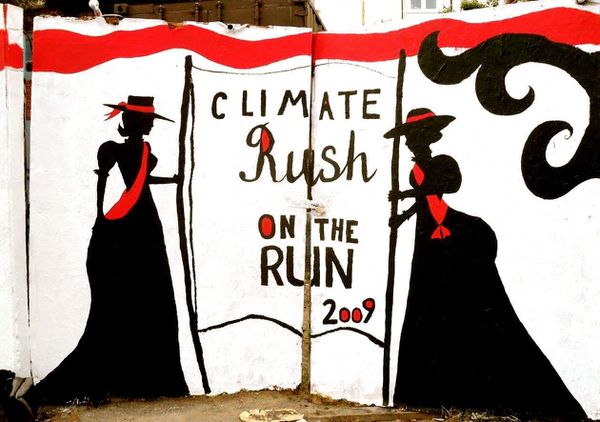Entre la imparable destrucción climática y la miopía política

Los contenidos y el tono de las negociaciones no refleja la urgencia de acción global exigida en las grandes manifestaciones ecologistas de estos días en las frías calles de la capital danesa, unas grandes movilizaciones que han sido pacíficas en su inmensa mayoría, aunque han contado con la escandalosa detención indiscriminada de 900 manifestantes, siendo que solo tres han sido acusados de violencia.
Aquí en Copenhague, los negociadores no han conseguido todavía un texto digno de ser considerado por los ministros y los jefes de estado. Estamos bastante lejos de una convergencia entre la agenda de objetivos de la Unión Europea, las posiciones de los países más reticentes como son EE.UU y Japón, y las reivindicaciones de "derechos al desarrollo y justicia" que piden el heterogéneo grupo de países del Sur. Está casi descartado el que pueda darse un acuerdo final en Copenhague con objetivos de reducción de emisiones legalmente vinculantes.

Ante este fracaso el mundo da un paso más hacia el abismo. Al menos se espera que pueda darse un mandato político claro y un marco de principio de acuerdo que pueda ser vinculante durante el próximo año 2010. Incluso, hasta este modesto objetivo de mínimos se augura que será difícil de alcanzar.
Hay dos propuestas generales enfrentadas entre los países del Norte y el Sur, con muchas variaciones en cada una, y con una multitud de cifras que bailan (de hecho, los distintos textos que circulan contienen en cada punto cifras muy dispares para poder elegir a la carta). Estas posiciones fundamentales representan dos opciones antagónicas y en contradicción. Por el lado de los países del Sur, como son India, China y Brasil, se pide mantener el modelo actual del Tratado de Kioto con objetivos más fuertes de reducción de emisiones para "los países industrializados" junto a una transferencia de tecnología y de dinero hacia "los países en desarrollo", pero a la vez sin que se apliquen a éstos "países en vías desarrollo" unos objetivos obligatorios y legalmente vinculantes de reducción de las emisiones contaminantes a la atmósfera. En todo caso, solo proponen objetivos de "aspiración". Los países del Sur justifican estas demandas a partir de "la deuda ecológica histórica" y "la contaminación per capita mucho mayor" de los países del Norte.
Por el contrario, algunos gobiernos de los países de la UE apuntan críticamente que con la simple prolongación de los acuerdos de Kioto solo se abordaría un tercio de las emisiones mundiales, lo que debilitaría cualquier esperanza civilizatoria de poder frenar el Cambio Climático por debajo de los 2 grados de aumento de temperatura, y teniendo en cuenta el rápido crecimiento de las emisiones contaminantes de países como China, India y Brasil.

En definitiva, el drama y la confrontación entre el desarrollo y la supervivencia ecológica están sobre la mesa. Se trata del choque irreconciliable entre lo percibido como "socialmente justo" y como "derecho al desarrollo" reclamado por los grandes países del Sur, y lo ecológicamente imprescindible de la actual situación climática del planeta que exige una drástica reducción global de las emisiones que amenazan las condiciones de habitabilidad y continuidad de la vida en la Tierra. El simple deseo político de una "justa y equitativa" convergencia de emisiones destructoras del clima "per capita" entre el Norte y el Sur dentro de 50 años, no es solución para poder afrontar las amenazas climáticas. Es decir, esta temible reclamación de igualación entre Norte y Sur de las emisiones contaminantes por persona, no puede frenar la imparable realidad biofísica del acelerado desorden climático.
Contrariamente, lo necesario desde el punto de vista de las exigencias climáticas del planeta es una transición rápida hacia una economía limpia en el Norte junto a un "salto de la rana" por parte de los países del Sur, para que estos no sigan miméticamente el actual camino suicida de atravesar primero la etapa histórica de la revolución industrial sucia basada en los combustibles fósiles, tal y como históricamente lo han hecho los países del Norte, e iniciar con ello una transición gradual y conjunta hacia una economía ecológicamente limpia. Esto obligaría a una gran transferencia de tecnología verde y a unos cambios significativos en las pautas mundiales de sobreconsumo y destrucción de los bienes naturales comunes.

El gobierno danés no ha ayudado
Un factor añadido a las dificultades de las negociaciones ha sido el propio gobierno anfitrión de Dinamarca. El muy conservador gobierno danés no está jugando un papel útil de mediador y promotor de un consensuado acuerdo de mínimos. Resulta bastante macabro el hecho de que el mismo gobierno danés encargado de organizar la cumbre está financiando las muy visibles campañas de los "negacionistas" en Copenhague: los que niegan la importancia y la prioridad de combatir mundialmente el Cambio Climático. Hace unos días se produjo la filtración de una propuesta danesa muy escorada hacia las posiciones más favorables a los EE.UU y los países del Norte, lo que creó un ambiente muy tenso y polarizado en el inicio de las negociaciones. En el fondo se duda del papel imparcial y consensuador de un gobierno que incluye a unos ministros abiertamente en contra de un acuerdo internacional ambicioso.
En suma, es muy grande la influencia de los lobbys industriales ambientalmente sucios, tanto en Dinamarca como en la cumbre en general, lo que contribuye a que los líderes políticos de los gobiernos pongan en suspenso la responsabilidad con los prioritarios intereses de la ciudadanía mundial y con la vida del planeta. La tragedia climática está servida.
DAVID HAMMERSTEIN
-----------------------------------------------------------------------------------------------------------
The COP and COP/MOP resumed work today, to discuss AWG-KP and AWG-LCA Chairs’ proposed draft texts.
The text under the ad hoc working group under the Convention track (LCA) received positive comments from developing countries, and critical from KP Parties and US. The Chair of the working group highlighted in the beginning that it was not in the mandate of the ad hoc working group to discuss the legal nature of the outcome of the COP15 or the negotiation process in general.
+ reference to both 1,5C and 2C objective remain, as well as different options for 2050 target, but
- long term targets they are aspirational.
- no global peak year
- no timetable for legally binding
- review is late, 2015 and although IPCC 5AR is mentioned it is only to inform, not to serve as basis
+ aggregate developed country reduction targets [25-40] [30] [40] [45] by 2020 compared to 1990
- 8 year period
+ Reductions [primarily] through domestic efforts;
Developing country mitigation action supported by international finance shall be subject to measurement, reporting and verification.
New and additional financial resources for developing countries
In this morning’s debate, the US was critical that the text did not adequately reflect the comments made. EU says the two texts do not give certainty for maintaining climate change to 2C and that the LCA was not balanced in terms of developed and developing countries. EU said also that to continue with KP without clarity for rest was not acceptable. The EU called for a new radically different approach to this negotiation.
AOSIS/Grenada also highlighted that legally binding outcome must be preserved.
Most developing countries underlined the two track approach and that the text has too keep as basis the continuity of KP, several delegations including India spoke of the sanctity of the continued Kyoto Protocol.
Australia said they had serious concerns and said that issues related to credible mitigation efforts from all countries, which are quantified and solidified in treaty, legally binding outcome in a fixed and short timeline, transparency of achievements and long term financing should be discussed at plenary and ministers.
Japan was most critical and called for high level informal consultation to be taken. Canada again criticised the mitigation part as insufficient to support agreement and called for international review of supported and autonomous actions of developing countries.
+ aggregate targets [30-45] by 2020 compared o 1990
- LULUCF regarding forest management, all pick their own reference level? (need to check)
- harvested wood products included
- nuclear and CCS both options included
+ discounting CDM is included as option
+ withholding AAUs for adaptation funding is included as option
EU/SWE reiterated that KP only represents 1/3 of global emissions and that legally binding agreement for this track alone will not suffice and not an option. EU also said that rules on AAUs, LULUCF and bunkers must be known before there is agreement on new commitments.
Regarding sectoral mechanisms for the future of CDM, it seems that despite general lack of support for the EU proposal there will be some language allowing for it to be further considered, probably at the next COP.
The REDD discussions have moved up from more technical level to AWG-LCA, with the key issue of national and/or subnational baselines remaining open. As a negative development all language regarding safeguards has been changed to formulations of ‘should be promoted’. On the good side, the text is referring to emissions, rather than loss of forest cover for example, improving the environmental integrity of the text.
Ps. Quote of the day from Nigeria at the COP/MOP plenary (referring to attempts by KP industrialised country parties to discontinue with the Protocol): “You do not kill the mother before the baby is born.”






